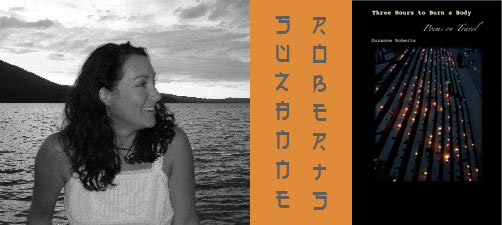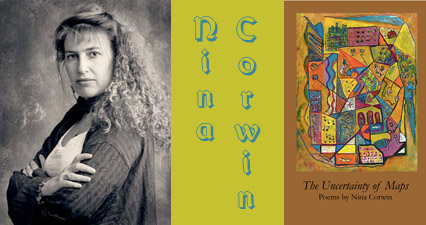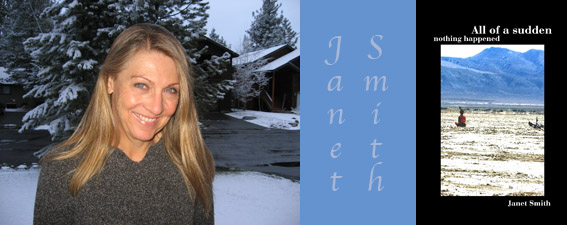Suzanne Roberts, Nina Corwin, and Janet Smith
Mon. Oct. 24 at 7:30 PM
R25 at 1719 25th Street
Host: Tim Kahl
Suzanne Roberts is the author of three books of poems, most recently Three Hours to Burn a Body: Poems on Travel. Her memoir Almost Somewhere: 28 Days on the John Muir Trail is forthcoming from the University of Nebraska Press. She was named “The Next Great Travel Writer” by National Geographic’s Traveler, she holds a doctorate in literature and the environment, and currently teaches English at Lake Tahoe Community College, as well as serving as the Distinguished Visiting Professor/Writer-in-Residence at Sierra Nevada College. For more information, please visit her website at www.suzanneroberts.org.
Poultry Stall
Saquisilí, Ecuador
A stout woman holds chickens
upside down, swinging them
by their feet. They do not fight her.
Their almond eyes wide, open
to an inverted world, looking
at nothing. A potential customer
comes by, feels the bodies
under the white feathers, already
meat. While the women negotiate
a fair price, the customer ruffles
her fingers along the bellies.
Still the chickens do nothing,
as we often do, resigned already
to being dead.
— Suzanne Roberts
Nina Corwin is the author of two books of poetry, The Uncertainty of Maps and Conversations With Friendly Demons and Tainted Saints. Her work has appeared in ACM, Forklift OH, Hotel Amerika, New Ohio Review, Southern Poetry Review, Verse and has been nominated for the Pushcart prize. Corwin is an Advisory Editor for Fifth Wednesday Journal and curates readings at Woman Made Gallery in Chicago where she co-edited Inhabiting the Body: A Collection of Poetry and Art By Women. She has read and performed her work across the country, at times set with musical or choreographic compositions. In daylight hours, she is a psychotherapist known for her work on behalf of victims of violence.Tangle Tangle
Today I have lunch
with the king’s bishop pawn. I’m torn
between the shadows of patriarchs,
the urge to knock the whole
board over. But a call comes in
from another district. The white rabbit
stopped taking her Lithium last week.
I have to mop up the mess.
Poems are burning. Ticker tape and ash
slip from the sky, jumpers I can’t rescue.
They keep falling flat. They are the sidewalk
and the pigeon droppings
splattered on the sidewalk. I walk on both,
no sense in my step. Check.
And countercheck. My parachute tangles
with the power lines. Alley cats laughing:
Trumped again, as in aces high
but for the trump that sweeps the deal.
If not diamonds, then clubs. Somebody calls.
The boy at the dike is springing a leak.
Either way, I’m forked
by the white queen’s rook. He’s robbing me blind.
No one’s explained that rook is crow-speak
for swindler and goniff.
I’m just supposed to know. Like the dirty jokes
I’ve pretended to get since seventh grade.
But other precincts have need of my services.
A skinflint consumed with a morbid fear
of tree stumps. A tour guide beside herself
in transcendental dysfunction –
a slipped tongue, no words for beauty.
She’s late late late. The bus is pulling
away from the curb.
—Nina Corwin
Janet Smith began college at thirty-five after a string of jobs in Yosemite National Park. She graduated with an MFA in creative nonfiction from the University of Minnesota in 2001.She is a past recipient of a Nevada Arts Board Fellowship in poetry and has been nominated for a Pushcart Prize. Her first book of poetry, All of a Sudden Nothing Happened, was published in 2010. She is on faculty in the English Department at Lake Tahoe Community College.I Could Say It
Because of the juniper, its twisted
body, the purpling of berries
on branches, the warmed bark, like the fur
of a bear asleep in the sun,
the birdhouse on its great limb,
I bought the cabin.I didn’t know who I was.
I stayed inside the painted walls,
waiting for a signal to go outside. Light
swung through the juniper; a pair
of chickadees left the birdhouse’s
small black mouth.The chickadees called
in their same three notes. I understood
how I could say a prayer. I could say it
to anything: a star singled out,
the air filling with snow,
a cloud shaped like a question mark.One prayer, over and over,
a charm against staying under a roof,
against five rooms of furniture,
the changeless noon of lamps.
I knew I had to buy back my body.
There are no signals, only hours.
— Janet Smith







